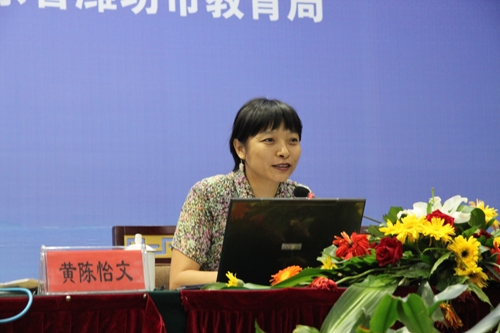The primary and secondary education, beginning at age 6 and ending at 18, play an extremely important role in children's growth. What areas should parents be concerned with for children at these stages?
Yiwen Caroline Chen Huang, an education expert with a Master's of Education from the Harvard Graduate School of Education, shared major concerns parents should have when their children are in elementary and middle school in a lecture held in Hangzhou this summer.
Below are some questions parents should ask themselves at the stage when their children are in elementary school:
1. How well has your child mastered basic subjects like Math, Chinese, and English?
For example, how much can your child read and express -- whether listening, speaking, reading, and writing skills meet the standard rather than merely refer to the academic performance. "Don't tell me that your child got 100 points in Chinese. What I want to know is if she can write a diary or keeps a habit of writing diaries. Did she write one page or two lines in her diary?" Huang said.
She cited an example that parents could assign a speech title like My Home's Puppy to children in the fifth and sixth grade. Check whether they could make a natural speech lasting for two or three minutes after a five-minute preparation. It shows language competence. Without this ability, it's useless to have high test scores in Chinese.
2. Can your child to get along with classmates well? Why or why not?
Huang stated that this was where parents could help their children. "Let your child know his or her advantages. If it's difficult to get along with classmates, what are the difficulties? How can these difficulties be overcome so it is easier to be with classmates?"
She emphasized that parents must help their children break through difficulties in interpersonal interaction and play to their strengths.
3. Does your child find it a pleasure to help others and know why it is good?
Huang pointed out that children should grow in the direction of being more grateful and altruistic.
4. What is your child most confident about?
Below are some questions parents should ask their children at the stage when they are in middle school:
1. What is the purpose of study? (Have a clear goal.)
The speaker explained that children ask themselves the purpose of study even if parents don't. Parents must help their children understand correctly the intention of study to stave off disliking school and the unawareness of future direction.
2. What is your child's interested in? Where will his or her career go? (Have a plan for the future.)
Parents should never believe that it's too early to ask their children these questions. Huang reminded, "I hold that children can think about it earlier because their interests will change. Even after a child grows in a direction for years, he realizes that that is not his favorite thing, hoping to change to another direction because what he learns is useless in his eyes. . . But parents should make it clear to their children that anything we study during our lifetime is useful and you will apply at different stages of life." She added.
Since every child varies in character and interests, parents need to encourage their children to develop their advantages in two areas, and meanwhile make their children understand that study at present is the foundation of doing what they are interested in.
3. Does your child make daily progress ? (Evaluate your child's capacity.)
Huang said making progress every day was the most important point. She asked her children to write three grateful things and another introspective one in daily diaries since they were in the second grade -- "Lord, I thank you for the things that happened today; for the things I can't do, I pray that you could help me."
About Yiwen Caroline Chen Huang:
Master's of Education at the Harvard Graduate School of Education, expert on bilingual cognition and multicultural education across the world. Caroline has over 30 years of front-line education experience in the USA.
Caroline has been working and living in Beijing for 6 years and works as an educational consultant and curriculum development supervisor in multiple international schools.
She is a mother of four. Her oldest daughter graduated from Harvard, the younger daughter from the University of California, and both of her sons are currently in middle school. She is the author of best-seller books likeTwo Generations' Experience at Harvard, and Discipline with Love.
- Translated by Karen Luo













